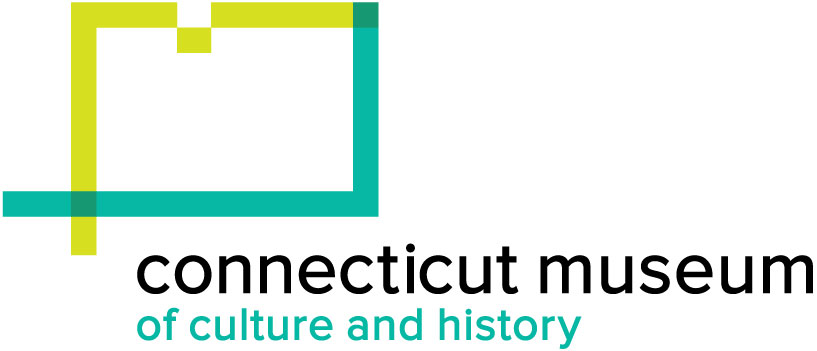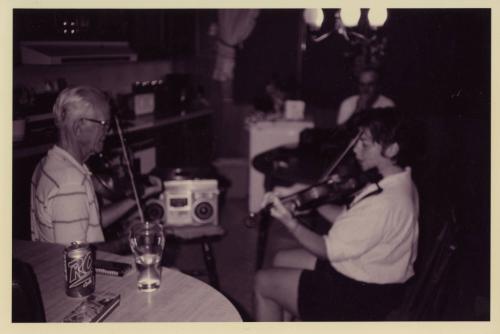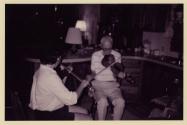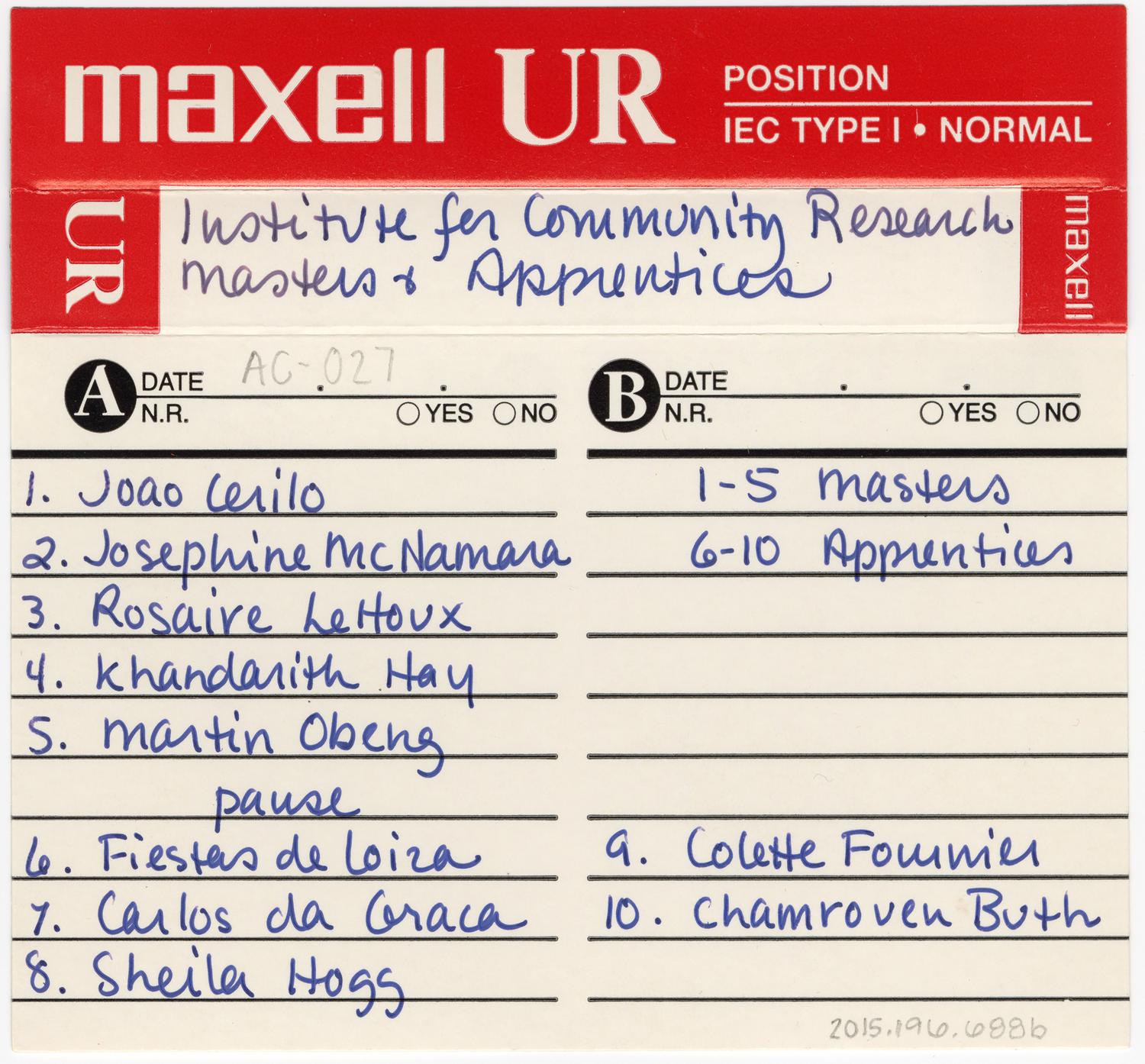Southern New England Traditional Arts Apprenticeship Program, Year 1, Franco American Fiddling with Rosaire Lehoux
SubjectPortrait of
Rosaire LeHoux
(Canadian, 1920 - 2013)
SubjectPortrait of
Colette Fournier
SubjectPortrait of
Ernest LeHoux
SubjectPortrait of
Wanda LeHoux
Date1999
MediumImage
ClassificationsGraphics
Credit LineConnecticut Cultural Heritage Arts Program collections
CopyrightIn Copyright
Object number2015.196.2.1-.10
Description2015.196.2.1: Photo of Rosaire Lehoux (teacher) and Colette Fournier (apprentice) playing fiddles
2015.196.2.2: Photo of Colette Fournier and Rosaire Lehoux playing fiddles
2015.196.2.3: Photo of Rosaire Lehoux’s feet as he taps the beat
2015.196.2.4: Photo of Rosaire Lehoux playing fiddle, note his unique bowing style
2015.196.2.5: Photo of Rosaire Lehoux playing fiddle, note his unique bowing style
2015.196.2.6: Photo of Rosaire Lehoux playing fiddle, note his unique bowing style
2015.196.2.7: Photo of Rosaire Lehoux playing fiddle, note his unique bowing style
2015.196.2.8: Photo of Rosaire Lehoux and Colette Fournier playing fiddle
2015.196.2.9: Photo of Colette Fournier playing fiddle
2015.196.2.10: Photo of Colette Fournier and Rosaire Lehoux playing fiddle
NotesSubject Note: The Southern New England Traditional Arts Apprenticeship Program is a CCHAP initiative since 1997 that fosters the sharing of community-based traditional (folk) artistic skills through the apprenticeship learning model of regular, intensive, one-on-one teaching by a skilled mentor artist to a student/apprentice. The program pairs master artists from RI, MA, or CT with apprentices from one of the other states, as a way to knit together members of the same community or group across state lines. Teaching and learning traditional arts help to sustain cultural expressions that are central to a community, while also strengthening festivals, arts activities and events when master/apprentice artists perform or demonstrate results of their cooperative learning to public audiences. The Connecticut Cultural Heritage Arts Program at the Connecticut Historical Society manages the program in collaboration with the Folk Arts Program at the Massachusetts Cultural Council and independent folklorist Winifred Lambrecht who has a deep knowledge of the folk arts landscape of Rhode Island. Primary funding for the program comes from the National Endowment for the Arts, with support also from the Connecticut Commission on the Arts, the Institute for Community Research, and the Connecticut Historical Society.2015.196.2.2: Photo of Colette Fournier and Rosaire Lehoux playing fiddles
2015.196.2.3: Photo of Rosaire Lehoux’s feet as he taps the beat
2015.196.2.4: Photo of Rosaire Lehoux playing fiddle, note his unique bowing style
2015.196.2.5: Photo of Rosaire Lehoux playing fiddle, note his unique bowing style
2015.196.2.6: Photo of Rosaire Lehoux playing fiddle, note his unique bowing style
2015.196.2.7: Photo of Rosaire Lehoux playing fiddle, note his unique bowing style
2015.196.2.8: Photo of Rosaire Lehoux and Colette Fournier playing fiddle
2015.196.2.9: Photo of Colette Fournier playing fiddle
2015.196.2.10: Photo of Colette Fournier and Rosaire Lehoux playing fiddle
Biographical Note: Rosaire Lehoux, born in Quebec in 1920 and raised on a small farm in Giroux, held a large repertoire of Quebecois fiddle tunes and spent his life playing fiddle at countless community events and dances in eastern Connecticut and Rhode Island. Rosaire was known for his “crooked tunes” and his unique way of holding the bow. Despite his age, he often jumped up to do a step dance at soirees, and he always kept the rhythm with his feet while playing fiddle. Rosaire played with the group "Les Joyeux Copains" along with Michel Grenier and Camille Richard, for many years in the 1990s. Rosaire served as a mentor to several apprentices in the program, including Colette Fournier and Nancy Lemme from Rhode Island and was especially influential to fiddler Daniel Boucher from Connecticut. Rosaire passed away in 2013.
Biographical Note: Colette Fournier. Born and raised in a family that cherished its French traditions, Colette learned music and songs at home from an early age. She increased her repertoire through a two-year apprenticeship with Ben Guillemette in Maine and with Rosaire Lehoux of Connecticut during the first year of the Southern New England Apprenticeship Project, and later with fiddler Donna Hebert in Year 9 (2006-2007) and Dan Boucher in Year 10. Colette regularly organizes quadrille dances in the French communities in Connecticut and Rhode Island and performs with the group La Sauterie with her sister and a niece. She continues to teach fiddle playing to others in various community settings. Colette's grandfather made and played Franco fiddles, she remembers. She has studied with Ben Guillemette from Maine, and learned some of Rosaire's "tunes with no names and the crooked tunes - with an odd number of beats in the A or B parts" during her Year 1 apprenticeship with him. The French Canadian fiddle apprenticeships were instrumental in bringing these musicians together to play all around New England.
Additional audio, video, and/or photographic materials exist in the archive relating to these artists.
Cataloging Note: This project was made possible in part by the Institute of Museum and Library Services MA-245929-OMS-20.
Status
Not on viewJohn Monteiro
2005 June 19
Raquel Figueiredo
2005 June 19
Graciela Quiñones-Rodriguez
2004 February 21
Daniel Boucher
2008 March 8





















